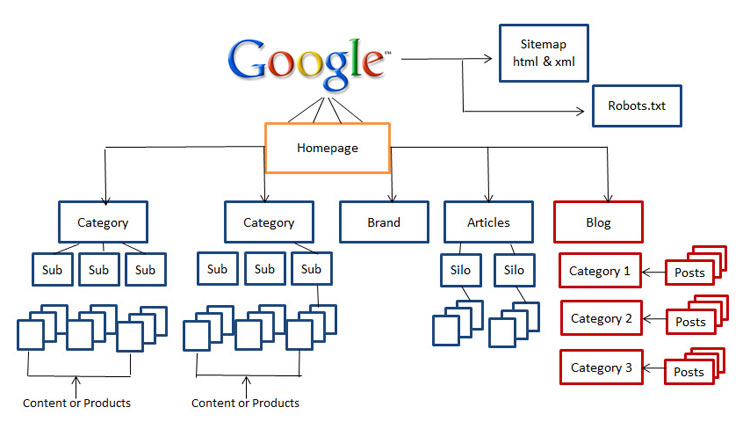Search engine optimisation for B2B companies differs significantly from how it works in the consumer world. It’s about volume and more about relevance. The most important thing is not how many people are searching for a particular word or phrase. The most important thing is that the right person will find you and your site. Therefore, we usually talk about qualitative SEO in B2B. But how do you think about qualitative SEO?
33 points to prioritise in B2B SEO
Here we’ve compiled the 33 most important items that affect your ranking at Google. We have divided them into different blog posts and here comes Part 2 about Architecture. The ambition is not to be comprehensive. Google has over 200 key ranking signals and over 10,000 subsets from which they originate. In addition, they make more than 900 updates per year. But by following the basic principles of your SEO as we present here, you will cover up the most important ones.

2.0 Architecture
The architecture and structure of your website are important factors when it comes to ranking and SEO. To succeed, an easy-to-understand structure, adapted for mobiles, unique pages and unique content, and preferably a quick site. Everything like Google and other search engines but also your visitors like.
2.1 Spindling
Can search engines easily search your pages on the site?
Search engines spindle web sites in less than milliseconds to find out which pages are relevant to the words a particular person searches for. When someone searches, the search engine finds all relevant pages and selects the one to appear at the top. Most pages do not have spindle problems, but there are things that can create issues such as JavaScript and Flash that hide links. A great way to avoid obstacles is to use Sitemaps, both HTML and XML.
2.2 mobile
Does your site work well for mobile devices?
Today, more mobile phone searches are taking place. Therefore, it’s no wonder that Google values mobile-friendly websites and makes it easier for them to rank high. Mobile-tuning the site is one of the most effective ways to rank higher. If you have an app, you may want to consider using app indexing and app linking to optimise even better.
2.3 Duplicate content
Does your pages contain much duplicate content?
If the search engine finds many pages with similar content, it’s hard to choose what’s most important. It’s good if multiple pages are about the same topic but it should not be duplicate content. If you have multiple pages with the same content, it’s good if only one appears for the search engines. Make sure you have the correct setting and you work in a thoughtful way with your URLs.
2.4 Speed
Do you load your pages quickly on different devices?
Google wants to make the web faster and therefore has informed that fast websites get a little overtaken over slow. But just because you have a fast website is not a guarantee of a good result. It is, after all, only a small factor in ranking. But for the visitor there are many benefits of a quick site.
2.5 URLs
Does your URL contain meaningful and relevant keywords?
Having their main keywords included in their URLs is not necessary, but it can help you raise your shave further. In addition, you will make it easier for your visitors to see where they are and what the page is about.
2.6 HTTPS
Does your site use HTTPS to provide a safe environment for your visitors?
Google would prefer the entire web world to be based on HTTPS servers so that those surfing will get the most secure environment possible. It also makes search engines reward websites that use HTTPS with a little ranking advantage. And for your visitors, it is of course interesting that you have a well-functioning and secure site.
Part 3 will be coming soon
This was the second part of a series of blog posts about SEO for B2B companies. Next blog post is about what to think about the HTML code. So keep your eyes and ears open!


